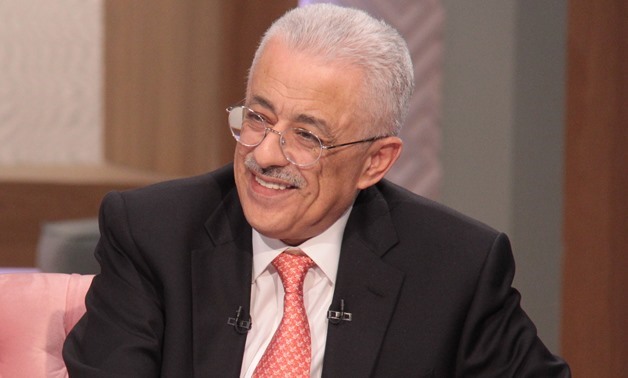
Education_Minister_Tarek_Shawqi - File Photo
CAIRO – 29 May 2018: The Ministry of Education has taken several steps to enhance education in Egypt, which is part of Egypt’s 2030 vision to cultivate economic and social justice and reviving the role of Egypt in regional leadership. Launching the first Arabic Citation Index (ARCI) worldwide comes at the top of these efforts.
First Arabic Citation Index worldwide
Minister of Education and Technical Education Tarek Shawki, a representative of the Knowledge Bank, signed on Monday a protocol with Clarivate Analytics to launch the first Arabic citation index worldwide.
The signing ceremony was attended by Minister of Culture Inas Abdel Dayem, head of Bibliotheca Mostafa el Feki, public figures, members of Parliament and leaders at the Ministry of Education.
“The ARCI will be powered by the Web of Science – the world’s most trusted and only publisher – neutral citation index for researchers in Egypt and across the 22 member states of the Arab League,” according to Clarivate Analytics’ website.
Shawki remarked that the index offers a real opportunity to invest in the field of scientific research, an easy access to Arabic scholarly content and the first ever mapping of Arabic scholarly literature.
He further remarked that the Ministry of Education is building a new system of education based on research, and hence it launched the Knowledge Bank, Egypt’s leading digital library and online knowledge hub, which is part of Egypt’s 2030 Vision to transform Egypt into a “knowledge economy”.
“Egypt’s 2030 Vision can be achieved only through changing the education system,” Shawki added, adding that the index will help Egypt export knowledge and thus enter the field of knowledge economy.
He further remarked that certified entities are not found to evaluate researches published in Arabic, but journals will be available in Arabic on the index for citation and evaluating the quality and research output of Arabic researchers.
“We need to establish an Arabic council to index journals and researches, and Egypt is leading a major process by indexing and exporting research abroad, and there is considerable support from the political leadership in this matter," Shawki said.
The new system of education
In the same context, he mentioned that the index is included in the new system of education at the secondary school, stressing that the Ministry of Education has contracted with many international entities to buy their contents and provide them to Egyptian students, along with buying 2D and 3D films, adding that 5,700 videos in English and Arabic have been bought. He said that these movies, Al-Adwaa book and other scientific content would be put on tablets.
He stated that a random exam would be prepared every week to encourage students to come to schools.
“The new system is better than the existing one, and 2,500 schools are being prepared with internet access with around 100 megabytes at each school,” Shawki said.
In early June, the ministry will declare its plan to train teachers in a partnership of several companies, including Discovery Company and the Education First program.
Earlier this month, Shawki announced that Thanaweya Amma students of one school will take their unified exam that is different from another school’s unified exam. Currently, Thanaweya Amma students nationwide take the same unified exam in each subject.
Shawki said that Egypt will sign a deal with the World Bank for $500 million to fund the government’s plan in the presence of Minister of Investment and International Cooperation Sahar Nasr in Washington.
Japanese schools
On the sidelines of the signing ceremony, the minister of education said in a press statement that the Egyptian-Japanese schools’ curriculum will be in Arabic at the primary school.
The Japanese education system, Tokkatsu, will be applied at 40 Egyptian-Japanese schools in different governorates in September.
A total of 20,000 teachers have applied to the ministry for training in the Japanese Tokkatsu education system.
Shawki added that the ministry will hold a meeting on June 4 to choose 1,500 students for Japanese schools.
Tokkastu is an educational system known in Japan that develops all the skills of the student, focusing on creativity and thinking rather than memorization and indoctrination.
The activities of the system allow students to practice teamwork and collaborate with colleagues to reach goals. Tokkatsu is applied to students within a class of no more than 40 students.
Activities are also aimed at building personality, teamwork skills, belonging, hygiene values, self-esteem, responsibility and thinking.
The Tokkastu system promotes students' self-confidence through several activities and skills, such as the allocation of a set of lessons to teach students hand washing and cleaning the classroom, the participation of students in school hygiene, food education, self-protection and behavior. Pupils also design activities and set goals for themselves, including mechanisms of implementation.
Secondary schools’ exams
To fight cheating and repeated Thanaweya Amma exam leaks, modern techniques will be used this year to monitor and control cheating pages on social media and take strict legal measures on anyone participating in the leaking of the exams, as a part of the Interior Ministry’s plan.
Leaking of exams has been a commonly widespread phenomenon in Egypt in recent years.
Social media and smartphones have made it easier for exams to be leaked. Therefore, the government has introduced a new high school examination paper, called the “Booklet”, designed to put an end to online cheating and exam leaks.

Comments
Leave a Comment